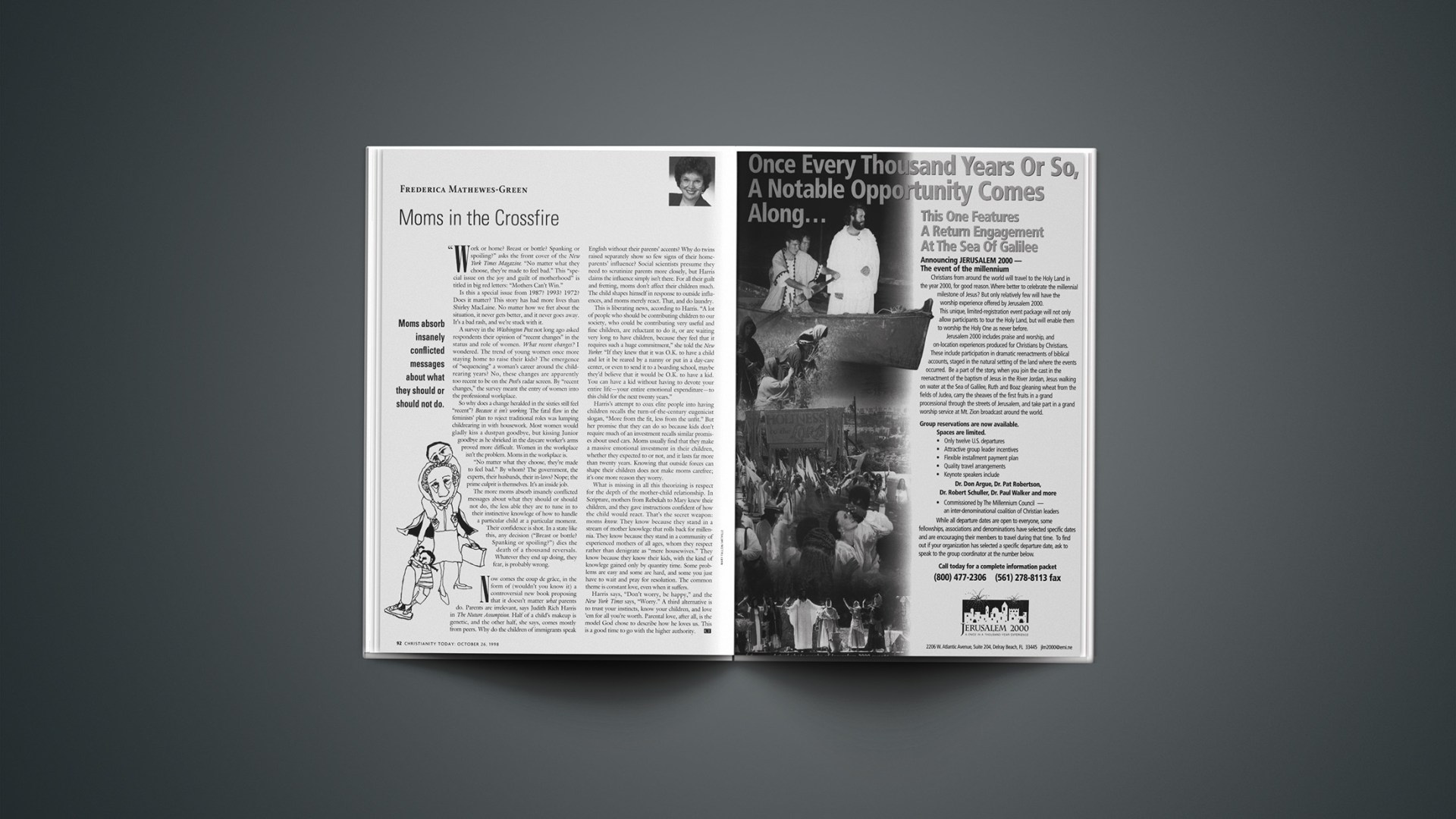Work or home? Breast or bottle? Spanking or spoiling?” asks the front cover of the New York Times Magazine. “No matter what they choose, they’re made to feel bad.” This “special issue on the joy and guilt of motherhood” is titled in big red letters: “Mothers Can’t Win.”
Is this a special issue from 1987? 1993? 1972? Does it matter? This story has had more lives than Shirley MacLaine. No matter how we fret about the situation, it never gets better, and it never goes away. It’s a bad rash, and we’re stuck with it.
A survey in the Washington Post not long ago asked respondents their opinion of “recent changes” in the status and role of women. What recent changes? I wondered. The trend of young women once more staying home to raise their kids? The emergence of “sequencing” a woman’s career around the childrearing years? No, these changes are apparently too recent to be on the I radar screen. By “recent changes,” the survey meant the entry of women into the professional workplace.
So why does a change heralded in the sixties still feel “recent”? Because it isn’t working. The fatal flaw in the feminists’ plan to reject traditional roles was lumping childrearing in with housework. Most women would gladly kiss a dustpan goodbye, but kissing Junior goodbye as he shrieked in the daycare worker’s arms proved more difficult. Women in the workplace isn’t the problem. Moms in the workplace is.
“No matter what they choose, they’re made to feel bad.” By whom? The government, the experts, their husbands, their in-laws? Nope; the prime culprit is themselves. It’s an inside job.
The more moms absorb insanely conflicted messages about what they should or should not do, the less able they are to tune in to their instinctive knowlege of how to handle a particular child at a particular moment. Their confidence is shot. In a state like this, any decision (“Breast or bottle? Spanking or spoiling?”) dies the death of a thousand reversals. Whatever they end up doing, they fear, is probably wrong.
Now comes the coup de grace, in the form of (wouldn’t you know it) a controversial new book proposing that it doesn’t matter what parents do. Parents are irrelevant, says Judith Rich Harris in The Nuture Assumption. Half of a child’s makeup is genetic, and the other half, she says, comes mostly from peers. Why do the children of immigrants speak English without their parents’ accents? Why do twins raised separately show so few signs of their home-parents’ influence? Social scientists presume they need to scrutinize parents more closely, but Harris claims the influence simply isn’t there. For all their guilt and fretting, moms don’t affect their children much. The child shapes himself in response to outside influences, and moms merely react. That, and do laundry.
This is liberating news, according to Harris. “A lot of people who should be contributing children to our society, who could be contributing very useful and fine children, are reluctant to do it, or are waiting very long to have children, because they feel that it requires such a huge commitment,” she told the New Yorker. “If they knew that it was O.K. to have a child and let it be reared by a nanny or put in a day-care center, or even to send it to a boarding school, maybe they’d believe that it would be O.K. to have a kid. You can have a kid without having to devote your entire life—your entire emotional expenditure—to this child for the next twenty years.”
Harris’s attempt to coax elite people into having children recalls the turn-of-the-century eugenicist slogan, “More from the fit, less from the unfit.” But her promise that they can do so because kids don’t require much of an investment recalls similar promises about used cars. Moms usually find that they make a massive emotional investment in their children, whether they expected to or not, and it lasts far more than twenty years. Knowing that outside forces can shape their children does not make moms carefree; it’s one more reason they worry.
What is missing in all this theorizing is respect for the depth of the mother-child relationship. In Scripture, mothers from Rebekah to Mary knew their children, and they gave instructions confident of how the child would react. That’s the secret weapon: moms know. They know because they stand in a stream of mother knowlege that rolls back for millennia. They know because they stand in a community of experienced mothers of all ages, whom they respect rather than denigrate as “mere housewives.” They know because they know their kids, with the kind of knowlege gained only by quantity time. Some problems are easy and some are hard, and some you just have to wait and pray for resolution. The common theme is constant love, even when it suffers.
Harris says, “Don’t worry, be happy,” and the New York Times says, “Worry.” A third alternative is to trust your instincts, know your children, and love ’em for all you’re worth. Parental love, after all, is the model God chose to describe how he loves us. This is a good time to go with the higher authority.
Copyright © 1998 Christianity Today. Click for reprint information.










